Taler: Difference between revisions
m →Bills |
m →Bills |
||
| Line 52: | Line 52: | ||
[[Category: Levantine Union]] | [[Category: Levantine Union]] | ||
[[Category: Burgundie]] | [[Category: Burgundie]] | ||
[[Category:Yonderre]] | |||
[[Category:Currency]] | [[Category:Currency]] | ||
[[Category:IXWB]] | [[Category:IXWB]] | ||
[[Category: Canonical Article]] | [[Category: Canonical Article]] | ||
[[Category:Economy of Burgundie]] | [[Category:Economy of Burgundie]] | ||
Revision as of 19:48, 6 November 2022
This article is a work-in-progress because it is incomplete and pending further input from an author. Note: The contents of this article are not considered canonical and may be inaccurate. Please comment on this article's talk page to share your input, comments and questions. |
| Taler | |
|---|---|
| Dollarium (Latin) Thaler (Aenglish) Noler (Fhasen) | |
| ISO 4217 | |
| Code | LUT |
| Denominations | |
| Subunit | |
| 1/100 | Cent |
| Plural | Talers |
| Cent | Cents |
| Symbol | ₮ |
| Cent | ¢ |
| Nickname | Dollar |
| Demographics | |
| Date of introduction | April 1st, 1343 |
The Taler (symbol: ₮; ISO code: LUT for Levantine Union Taler), sometimes known as the dollar, the thaler, and officially as the Levantine Taler, is the official currency of the Levantine Union. It is subdivided into 100 pence (singular: penny). At various times, the taler was commodity money or bank notes backed by silver or gold, but it is currently fiat money, backed only by the economy in the areas where it is accepted. The taler is one the world's oldest currency still in use and which has been in continuous use since its inception. It is in use throughout the talerzone.
History
Market and Currency Authority of the Levantine Union
Bills
The Taler bills, issued in denominations of 1, 5, 10, 20, 50, and 100, each display elements related to different members of the Levantine Union. Typically, the obverse shows an iconic structure associated with the nation being represented while the reverse depicts a founding figure of the nation. Burgundie's represented bill - the 20 Taler note - breaks convention by showing its association with the sea on the obverse and a national romantic personification on the reverse. Although the specific artwork and design is chosen by the Levantine Union Currency Authority, the specific items to be depicted are established by official acts of the member governments of the Union.
| Obverse | Reverse | Country or Place Represented | Symbols and Figures |
|---|---|---|---|
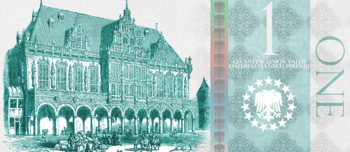 |
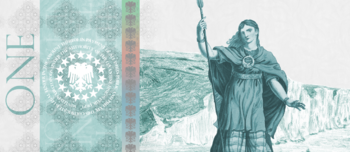 |
Fiannria | Old Brídhavn Tyn Hall (Obverse) St. Bridget the Martyr (Reverse) |
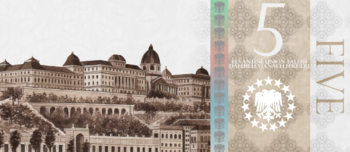 |
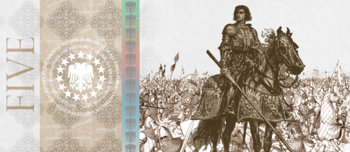 |
Yonderre | Collinebourg Palace (Obverse) Joanus de Martigueux (Reverse) |
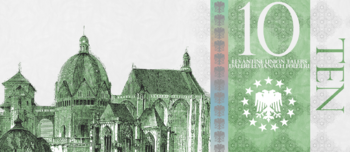 |
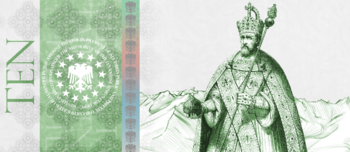 |
Deric States | Imperial Palace (Obverse) Conchobar I, Emperor of the Levantines (Reverse) |
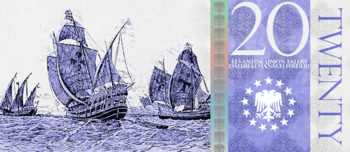 |
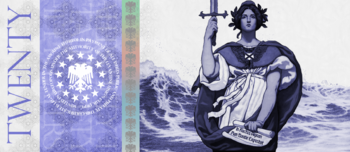 |
Burgundie | 16th and 17th century Southern Deric trade ships (Obverse) Marin-Estelle, personification of Burgundie (Reverse) |
| File:50obv.png | 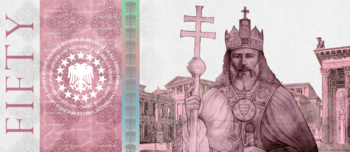 |
Urcea | Julian Palace (Obverse) St. Julius I (Reverse) |
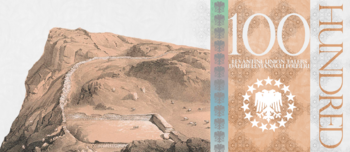 |
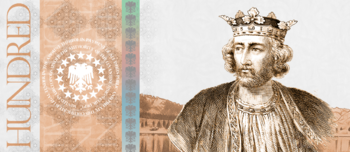 |
Anglei | Anglasweorc (Obverse) Margrave Edmund I(Reverse) |